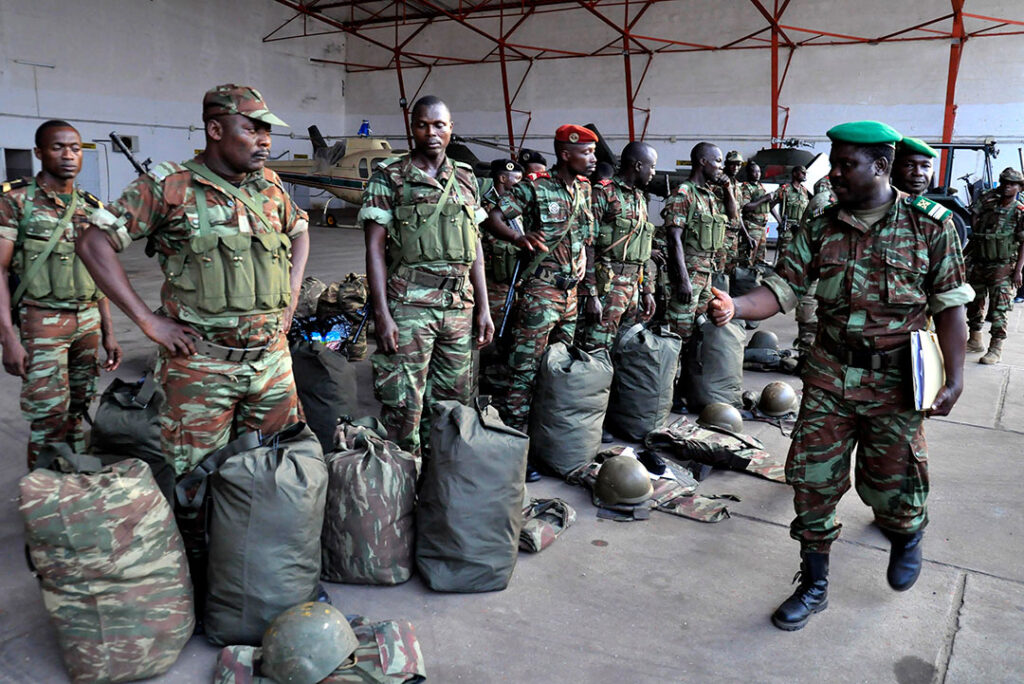ADF STAFF
Deep in Benin’s Pendjari National Park, a former luxury resort has become a military base. There, Soldiers are tracking the movements of extremists coming and going from neighboring Burkina Faso in an effort to stop a surge in violence.
In recent years, Benin has seen terrorist attacks in its northern Atakora and Alibori departments as the extremism that has crippled Burkina Faso seeps south. The military that previously spent much of its time serving on peacekeeping missions has been redeployed to defend its own country.
Since terrorists attacked a military outpost in Porga in 2021, the country’s leadership has poured $130 million into strengthening its security. Along the northern border area, a special unit created in 2023 has the task of curtailing terrorism.
Along with the intelligence gathering unit in Pendjari, other military bases have gone up across the region. More than 3,000 Soldiers patrol border communities in Atakora and Alibori. A recruitment drive aims to train and deploy 5,000 more Soldiers to the northern region.
Burkina Faso’s difficulty in bringing extremists to heel has turned it into a base from which terrorists are spreading south to countries along the Gulf of Guinea.
“The Burkina Faso military have long since abandoned the area just north of the border,” Benin Col. Faizou Gomina told New Lines Magazine recently. “As a result, jihadists and criminal gangs have formed large bases, which they use to stage attacks into our sovereign territory.”
Much of that activity takes place in Pendjari and nearby W National Park. Together, they are part of the transnational W-Arly-Pendjari complex of wildlife areas along the borders of Benin, Burkina Faso, Niger and Togo. Created as a haven for elephants and other wildlife, the parks have more recently become a haven for terrorists who use the lightly populated expanses to transport people and material.
In March, Soldiers killed fighters affiliated with the Islamic State group (IS) who were trying to establish a base in W National Park. The presence of IS fighters was a surprise for the military, which has been fighting extremists tied to al-Qaida-related Jama’at Nusrat al-Islam wal-Muslimin (JNIM), Beninese Lt. Col. Matthieu Hessou told France 24.
“The maps, Islamic militant flags — these signs show us that it’s not just them [JNIM] but also other unrelated groups that want to set up shop and carry out their missions,” Hessou said.
Pendjari National Park has been closed since Benin’s first terrorist attack in 2019, which killed two French tourists and their safari guide. The closing of the park has hurt the region’s economy.
As they move through northern Benin, extremists are recruiting new members and attacking civilian targets. By creating insecurity in the region, the terrorists hope to undercut support for Benin’s government, according to experts.
Attacks have escalated quickly. According to military officials, northern Benin experienced 54 attacks between January and mid-April of 2023. Kidnappings jumped from zero in 2021 to 33 in 2023, according to the Global Initiative Against Transnational Organized Crime (GI-TOC).
In May, extremists attacked the communities of Koabagou and Toura near Pendjari, killing 20 residents and kidnapping young men. In communities such as Materi, extremists have planted bombs and kidnapped residents.
“I can’t sleep at night, we’re not free to travel, to move,” Materi resident Florence Bati told The Associated Press. “People are too afraid.”
Attacks have driven more than 12,000 people from their homes and farm fields in northern Benin.
In addition to expanding its military presence in the area, the government has imposed curfews and banned gatherings. In a few communities, it banned the use of motorbikes, which are a common way for attackers to get around, particularly at night.
However, the government also limits information about attacks and arbitrarily arresting people it views as potential threats — two steps that are creating ill will among the population and driving some people to side with the extremists, according to Bertin Assogba, coordinator for Durable and Develop Reference, a local aid group focused on defending human rights.
“The jihadists live with the populations, the citizens know them, but they refuse to denounce them because the government doesn’t encourage people to do so,” Assogba told the AP.

